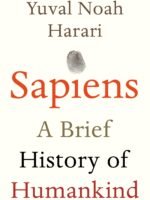From a renowned historian comes a groundbreaking narrative of humanity’s creation and evolution—a #1 international bestseller—that explores the ways in which biology and history have defined us and enhanced our understanding of what it means to be “human.” One hundred thousand years ago, at least six different species of humans inhabited Earth. Yet today there is only one—homo sapiens. What happened to the others? And what may happen to us? Most books about the history of humanity pursue either a historical or a biological approach, but Dr. Yuval Noah Harari breaks the mold with this highly original book that begins about 70,000 years ago with the appearance of modern cognition. From examining the role evolving humans have played in the global ecosystem to charting the rise of empires, Sapiens integrates history and science to reconsider accepted narratives, connect past developments with contemporary concerns, and examine specific events within the context of larger ideas. Dr. Harari also compels us to look ahead, because over the last few decades humans have begun to bend laws of natural selection that have governed life for the past four billion years. We are acquiring the ability to design not only the world around us, but also ourselves. Where is this leading us, and what do we want to become? Featuring 27 photographs, 6 maps, and 25 illustrations/diagrams, this provocative and insightful work is sure to spark debate and is essential reading for aficionados of Jared Diamond, James Gleick, Matt Ridley, Robert Wright, and Sharon Moalem.
Towards People’s Histories In Pakistan
₨1,780₨1,999
After seventy-five years of independence, the history of Pakistan remains centered on the state, its ideology and the two-nation theory. Towards Peoples’ Histories in Pakistan seeks to shift that focus away from histories of an imagined nation, to the history of its people.
Related products
Yousuf Bin Tashfin
₨1,250Yousuf Bin Tashfin by Naseem Hijazi is a historical novel that portrays the life and leadership of the famous Berber king, Yousuf Bin Tashfin. It explores his rise to power, military conquests, and role in the spread of Islam
₨1,400Homo Deus A Brief History of Tomorrow
₨599Yuval Noah Harari’s Homo Deus explores humanity’s future, focusing on technological advancements, artificial intelligence, and biotechnology. The book raises profound questions about human purpose, ethics, and the challenges of navigating an era dominated by data and unprecedented capabilities.
₨1,200Sindh Under the Mughals: Origin and Development Of Historiography (1591-1737 Ce)
₨980Sindh Under the Mughals by Humera Naz examines the historical development of Sindh during the Mughal era. The book focuses on the historiography, analyzing how historical narratives were formed and the impact of Mughal rule on the region from 1591 to 1737.
₨1,100Freedom at Midnight
₨1,199Freedom at Midnight recounts the dramatic and turbulent events leading to the partition of India in 1947. The authors take a close look at the final year of British rule in India, providing insights into the roles of figures like Lord Mountbatten, Mahatma Gandhi, Jawaharlal Nehru, and Muhammad Ali Jinnah. The book covers the intense political negotiations, personal conflicts, and the immense human cost of the partition, which led to the creation of India and Pakistan. The authors use a rich narrative style to present the historical events, making the book a compelling read for anyone interested in the history of Indian independence and the complexities of decolonization.
₨2,345The Last Mughal: the Fall Of Delhi 1857
₨3,000On a dark evening in November 1862, a cheap coffin is buried in eerie silence. There are no lamentations or panegyrics, for the British Commissioner in charge has insisted, ‘No vesting will remain to distinguish where the last of the Great Mughals rests.’ This Mughal is Bahadur Shah Zafar II, one of the most tolerant and likeable of his remarkable dynasty who found himself leader of a violent and doomed uprising. The Siege of Delhi was the Raj’s Stalingrad, the end of both Mughal power and a remarkable culture.
₨3,395Sapiens: a Brief History Of Humankind
₨2,390#1 international bestseller—that explores the ways in which biology and history have defined us and enhanced our understanding of what it means to be “human.” One hundred thousand years ago, at least six different species of humans inhabited Earth. Yet today there is only one—homo sapiens. What happened to the others? And what may happen to us? Most books about the history of humanity pursue either a historical or a biological approach, but Dr. Yuval Noah Harari breaks the mold with this highly original book that begins about 70,000 years ago with the appearance of modern cognition
₨2,995Homo Deus: A Brief History of Tomorrow
₨799Homo Deus: A Brief History of Tomorrow explores the potential future of humanity as we move beyond the struggles for survival and enter an era where humans seek to achieve god-like powers. Harari examines the rise of artificial intelligence, genetic engineering, and the pursuit of immortality. He considers how these advancements could reshape human society, ethics, and individual identity. The book poses challenging questions about the meaning of life, the evolution of consciousness, and the role of humans in a future dominated by machines.
Nexus: A Brief History of Information Networks from the Stone Age to AI
₨799Harari traces the evolution of information networks from prehistoric communication methods to modern-day digital systems. This book explores how each advancement in human connectivity has shaped societies, economies, and civilizations, culminating in the impact of artificial intelligence on our world.
₨1,199









